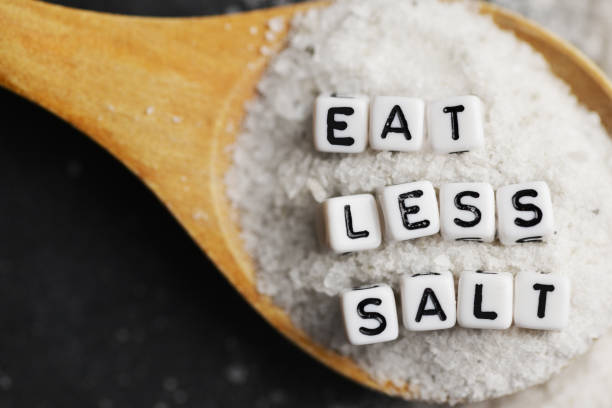High blood pressure (or hypertension) is one of the most important risk factors for developing heart disease and stroke. Many factors can influence blood pressure, including genes, lifestyle, and diseases like kidney disease. Lifestyle factors play the largest role in raising or decreasing blood pressure for most people.
Reduce salt intake: Salt or sodium chloride has been used for flavouring and preserving foods for thousands of years and can be found in many foods. Both sodium and chloride are vital for many body functions. One of these is managing the fluid balance, which regulates blood pressure. Too much salt can disrupt this balance, which can lead to an increase in blood pressure. To reduce the risk of heart disease and high blood pressure, the European Food Safety Authority suggests limiting our intake of salt to 5 g per day (roughly 1 teaspoon).
Get enough potassium
Low potassium intake has been linked to high blood pressure, much like high salt intake. Potassium is essential for many bodily processes. Like sodium, it helps regulate blood pressure by maintaining the fluid balance in our blood. Potassium can counter the negative effects of sodium and maintain healthy blood pressure. Many fruits and vegetables are rich in potassium, including bananas, potatoes and spinach.
Balance your diet
Other nutrients can also influence blood pressure. A balanced diet high in fruits and vegetables and low in salt, sugars, and saturated fat can help us get a range of beneficial nutrients. It also helps to maintain our energy balance and blood pressure.
Many dietary options have been proven to lower blood pressure. The most effective ones include the Dietary approach to stop hypertension (DASH) and the Mediterranean Diet.
Keep your body healthy
Maintaining a healthy weight is a key factor when it comes to controlling blood pressure. The demand for the heart increases with increasing body weight. This can lead to an increase in blood pressure. Many biological, psychological, and environmental factors influence the complex system that regulates our body weight. Some people find it more difficult to lose or maintain their weight than others. These factors can vary between people. We must eat fewer calories when it comes to weight loss. There is no one-size-fits-all approach to weight loss. The best approach is enjoyable and can be maintained over the long term.
Get physically active
Both body and mind have been consistently shown to benefit from physical activity. This includes a positive impact on blood pressure. Regular physical activity can increase our heart’s strength, which reduces the effort needed to pump blood around the body. This reduces blood pressure by reducing the force exerted on our arteries. The World Health Organization recommends getting at least 150 minutes of moderate exercise (e.g. Brisk walking or 75 minutes of vigorous exercise (e.g. Running) each week. This is equivalent to 30 minutes of moderate exercise five days a week. Additional benefits can be obtained by increasing your activity levels beyond this threshold.
Don’t smoke
Smoking cigarettes can cause the buildup of fatty material in our arteries. This can lead to an increase in blood pressure and can cause clogging of our arteries. This increases your risk for a stroke or heart attack. To protect your long-term health, quitting smoking is the most important lifestyle choice you can make. A reduced chance of high blood pressure is one of the many health benefits of quitting smoking.
Limit alcohol intake
A high level of alcohol intake can cause many health problems, much like smoking. High alcohol intake can lead to high blood pressure. 200 ml 12.5% vol wine and 500 ml 5% vol beer per week. However, recommendations can vary between European countries and different health organizations.

